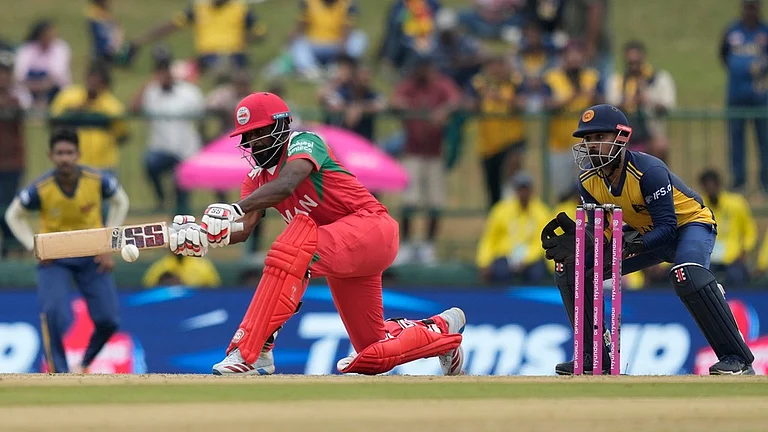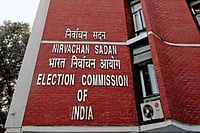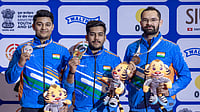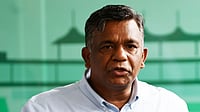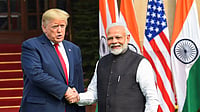Playing the character of 'Bheem' in blockbuster TV series 'Mahabharat' made him a household name but much before that, Praveen Kumar Sobti was an athlete par excellence and remains India's first and only hammer throw medal winner in the Commonwealth Games. (More Sports News)
The 74-year-old breathed his last in New Delhi on Monday evening following a cardiac arrest, and it was hardly a surprise to see tributes pouring in from all quarters, his name etched in public memory for the brilliant portrayal of 'Bheem' in the B R Chopra magnum opus.
But the towering man from Punjab's Sarhali Kalan town was much more than that.
He was a former BSF soldier and also won four medals, including two gold, in the Asian Games for India. And as they mourned his demise his former team-mates recalled the "caring, jolly man" that Sobti was.
Sobti dominated the discus and hammer throw events for many years during '60s and '70s, winning medals in three Asian Games, one Commonwealth Games and taking part in two Olympics -- the 1968 Mexico editions and the ill-fated 1972 Games in Munich where Israeli athletes were massacred by a Palestinian terrorist group.
Sobti's discus throw gold medals came in the 1966 and 1970 Asian Games. He won a hammer throw bronze in the 1966 Asian Games and a silver in the same discipline in the Commonwealth Games that year. He also won a discus throw silver in the 1974 Asian Games.
His hammer throw silver remains the only one that an Indian has won at the CWG.
But his sporting journey ended after he took the entertainment plunge starting with small roles, which was followed by national fame. He even dabbled in politics, joining the Aam Aadmi Party in 2013, before shifting allegiance to the Bhartiya Janata Party the next year.
"He was a happy-go-lucky and positive man full of energy. Whether it is during competitions, training or simple chats or get togethers, he was always jolly and full of life.
"He would laugh, crack jokes and keep others happy and entertained. If he is there, everybody is happy. All of us knew that with him, it will be a happy ambience," Bahadur Singh, his senior contemporary, told PTI.
Sobti was just 19 when he won a discus throw gold and hammer throw bronze in the 1966 Asiad and his medals came when he was studying at the Khalsa College in Amritsar.
"He won an Asian Games gold when he was at Khalsa College in Amritsar where I was also studying. He was very down to earth and without any attitude of a successful athlete," Singh, himself a decorated athlete with a shot put gold in the 1978 and 1982 Asian Games, said.
"He was like my younger brother. I used to spend a lot of time with him. Not only a decorated athlete, he was an excellent human being. Later, he entertained us with his role in 'Mahabharat'."
Sobti took to acting and became popular following his role in Mahabharat in 1988. He featured in supporting parts in close to 50 movies like "Yudh", "Adhikar", "Hukumat", "Shahenshah", "Ghayal" and "Aaj Ka Arjun".
"I don't know whether he (Sobti) had inclination towards acting or not when we met and competed together. He definitely didn't have any financial issues as such. He must have taken part in some audition or interview and then got selected for the role in 'Mahabharat'," Singh said.
Veteran athletics administrator Lalit Bhanot described Sobti as a likeable and easy-to-befriend human being.
"He easily mixed with others, engaged with his jovial nature. He was a very likeable man. He was also always ready to help others.His national records also stood for quite a long time," said Bhanot, a former Athletics Federation of India Secretary and current Planning Committee chief.
"He later joined Border Security Force and he kept on winning medals for country while working with BSF. His passing away is a great loss to Indian athletics."
Legendary 800m runner Sriram Singh said Sobti would treat every junior athlete with affection and respect.
"I was with him in the 1972 Olympics and I was junior to him. But he would not make me feel like that. He was a well-known athlete at that time having won gold in Asian Games but he would speak to us freely and made things easy for junior athletes also."
"He was great athlete as well as a great human being," said Sriram who won gold in the 1974 and 1978 Asian Games and a silver in the 1970 edition.










